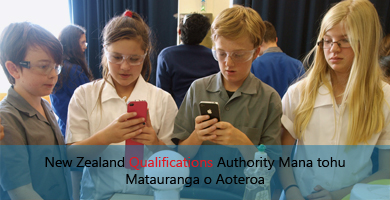Welcome to the NZQA Website
Hello, Tena koutou, Kia Orana, Fakaalofa lahi atu, Talofa lava, Gude tru olgeta, 你好, Taloha ni, Malo e lelei, Ni sa bula vinaka, Kia ora tatou NZQA ensures that New Zealand qualifications are valued as credible and robust both nationally and internationally. NZQA's role in the education sector is to ensure that New Zealand qualifications are accepted as credible and robust, nationally and internationally, in order to help learners succeed in their chosen endeavours and to contribute to New Zealand society.

Studying in New Zealand
New Zealand’s education system allows for flexibility, choice and great support. At its heart is the New Zealand Qualifications' Framework (NZQF). This lists all qualifications in a series of levels, from Level 1 to 10, and includes certificates, diplomas and degrees. Whether you’re studying at secondary or tertiary level, it’s a good idea to check that your study programme will lead towards a qualification listed on the NZQF, because this means it’s quality assured. In New Zealand, secondary education runs from Year 9 (around 12-14 years old) up to Year 13 (around 16-18 years old). Students generally work towards the National Certificate of Educational Achievement (NCEA) where they begin level one in Year 11 and work through to level 3 in Year 13. Students ready to continue their study have a great selection of tertiary education options to choose from in New Zealand, from universities to institutes of technology and polytechnics, private training establishments, wānanga, or workplace training. New Zealand welcomes international students from all around the globe to our education institutions. New Zealand’s qualifications are world-class, and we have a number of systems in place to make sure our international students are looked after well. New Zealand's National Certificates of Educational Achievement (NCEA) are national qualifications for senior secondary school students.. NCEA challenges students of all abilities in all learning areas, and shows credits and grades for separate skills and knowledge. It enables students to gain credits from both traditional school curriculum areas and alternative programmes.
